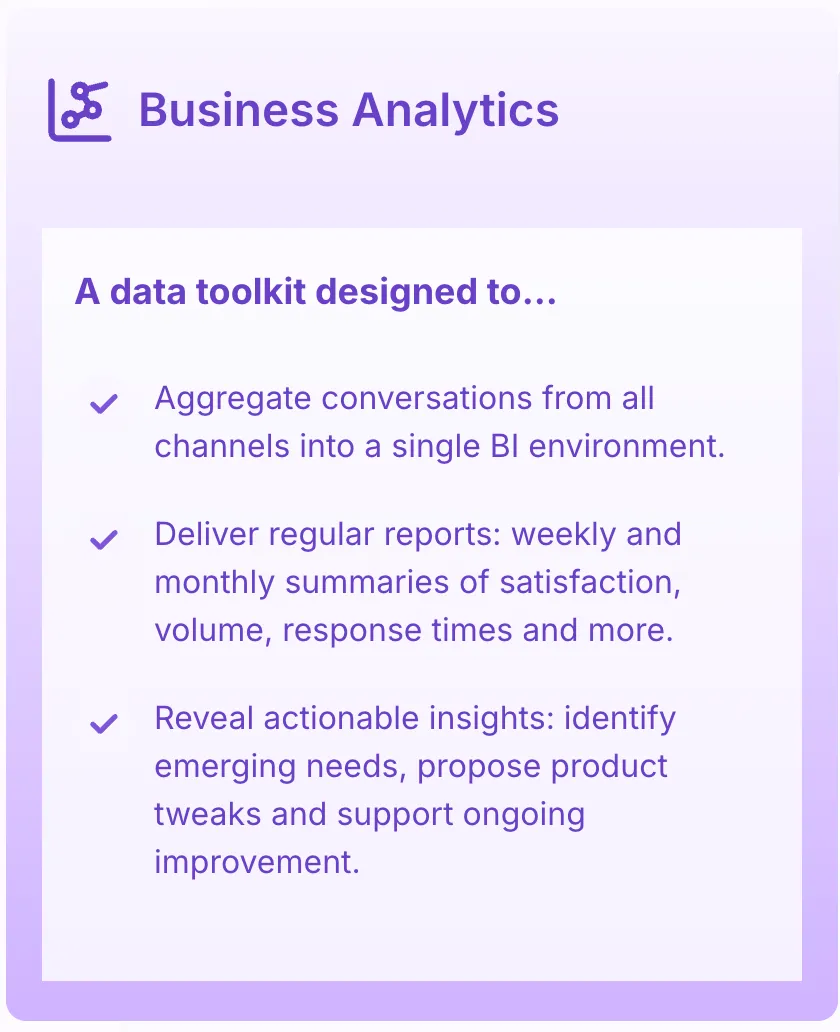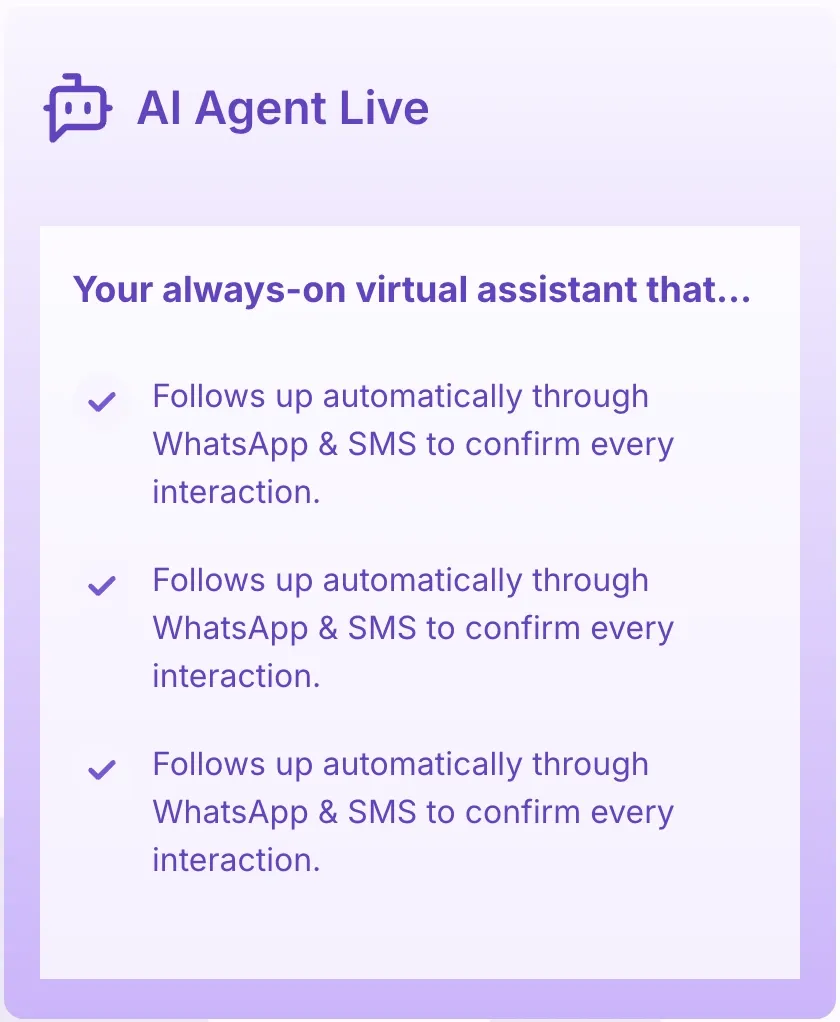The influence of AI on customer support goes beyond simple automation:
- Instant Problem Solving: AI systems instantly analyze customer issues, offering immediate solutions
- Always-On Support: Continuous assistance without the need for human involvement
- Efficient Operations: Managing multiple customer interactions at the same time
The combination of automation and personalization through Generative AI creates a robust customer service ecosystem. These AI systems learn from each interaction, adjusting their responses to provide tailored solutions that align with individual customer preferences.
Companies using Generative AI in their customer support operations are seeing:
- Response times cut by up to 80%
- Higher customer satisfaction rates
- Significant cost savings in support operations
- Improved ability to tackle complex customer inquiries
This technological breakthrough signifies a new era in enterprise customer support, where efficiency and personalization go hand in hand on a large scale.
The Role of Generative AI in Enterprise Customer Support
AI-powered conversational tools have transformed customer service operations with advanced chatbots and virtual assistants. These intelligent systems work around the clock, offering immediate support and ensuring consistent service quality in every customer interaction.
How Modern Enterprise Chatbots Use Natural Language Processing
Modern enterprise chatbots use natural language processing to:
- Understand complex customer queries
- Detect customer sentiment and intent
- Provide contextually relevant responses
- Learn from past interactions
- Escalate complex issues to human agents
The Benefits of Generative AI for Virtual Assistants
Virtual assistants powered by generative AI can create personalized responses for each customer inquiry. This technological advancement replaces the inflexible, template-based responses of traditional chatbots, making conversations feel more natural and human-like.
How Generative AI Is Improving Customer Experience Metrics
The ability of generative AI systems to provide real-time responses has significantly improved customer experience metrics:
- Reduced Wait Times: Customers receive immediate answers to their questions
- Increased First Contact Resolution: AI systems solve problems without needing human help
- Enhanced Satisfaction: Personalized interactions boost customer engagement
- Streamlined Support: Automated routing sends complex queries to the right specialists
The Various Customer Inquiries Handled by AI Systems
These AI systems effectively manage a wide range of customer inquiries across different channels:
- Product information requests
- Technical troubleshooting
- Account management
- Billing queries
- Service upgrades
- Appointment scheduling
The Scalability of Generative AI in Customer Support
By incorporating generative AI into customer support, businesses can create a scalable infrastructure that adjusts to fluctuating customer needs. Enterprise systems now have the capability to handle thousands of simultaneous interactions while upholding high service quality and personalization standards.

Benefits of Generative AI Models like Salesforce's Service GPT
Salesforce's Service GPT is a great example of how generative AI can transform customer support. This powerful AI model creates personalized solutions that address specific customer challenges:
Intelligent Content Generation
- Crafts customized responses based on customer history
- Adapts communication style to match customer preferences
- Generates relevant product recommendations
- Creates step-by-step troubleshooting guides
Service GPT's automation capabilities streamline support operations by:
- Handling routine inquiries 24/7
- Processing refund requests
- Managing appointment scheduling
- Updating customer information
- Creating support tickets automatically
The AI model's deep learning capabilities enable sophisticated customer understanding through:
Pattern Recognition
- Identifies common customer pain points
- Predicts potential issues before they escalate
- Analyzes customer sentiment in real-time
Service GPT's ability to process vast amounts of data results in:
- Faster response times
- Reduced customer wait times
- Higher first-contact resolution rates
- Improved customer satisfaction scores
These AI models continuously learn from interactions, refining their responses and building comprehensive knowledge bases. The technology integrates seamlessly with existing customer relationship management systems, creating a unified support experience that combines automated efficiency with human-like understanding.
Human service agents benefit from AI assistance through:
- Smart routing of complex cases
- Suggested solutions based on historical data
- Automated documentation of customer interactions
- Real-time translation services

Aligning with Broader Trends in Enterprise AI
Generative AI's impact extends beyond customer interactions, reshaping entire enterprise workflows. Organizations implementing AI-driven solutions report a 35% reduction in process completion time and significant improvements in operational efficiency.
Key Workflow Optimizations
Key workflow optimizations include:
- Automated ticket routing based on context and complexity
- Smart resource allocation through predictive analytics
- Real-time process adjustments based on performance metrics
- Intelligent knowledge base updates that evolve with customer interactions
Data Intelligence Capabilities
Data intelligence capabilities amplify operational effectiveness through:
- Pattern recognition in customer behavior
- Predictive maintenance of support systems
- Resource utilization forecasting
- Service quality monitoring
Decision-Making Processes in Customer Support
Decision-making processes in customer support have evolved with AI-powered insights:
- Rapid Issue Resolution
- AI analyzes historical data to suggest optimal solutions
- Predicts customer needs before they escalate
- Resource Management
- Smart scheduling based on support volume predictions
- Skills-based routing to appropriate team members
- Quality Assurance
- Automated performance monitoring
- Real-time feedback on support interactions
Enterprise AI systems now integrate with existing tools like CRM platforms, ticketing systems, and communication channels. This integration creates a unified ecosystem where data flows seamlessly between different touchpoints, enabling support teams to make informed decisions quickly and efficiently.
Companies leveraging these AI capabilities report a 25% increase in first-contact resolution rates and a 40% improvement in customer satisfaction scores. These metrics demonstrate the tangible impact of aligning generative AI with broader enterprise strategies.

Adoption Trends and Future Projections
Research from Gartner predicts 87% of businesses will integrate generative AI into their operations by 2026. This rapid adoption rate signals a transformative shift in enterprise customer support strategies.
Key adoption indicators show:
- 65% of enterprises currently experimenting with generative AI pilots
- 42% implementing AI-powered chatbots
- 38% utilizing AI for customer data analysis
- 31% developing custom generative AI solutions
The financial investment in generative AI technology continues to surge, with projected spending reaching $98.4 billion by 2026. This substantial growth reflects the technology's critical role in:
- Operational Excellence
- Automated ticket routing
- Predictive customer needs analysis
- Real-time service optimization
- Strategic Implementation
- Custom knowledge base development
- Agent productivity enhancement
- Service scalability improvements
Enterprise leaders recognize generative AI as a competitive necessity rather than a luxury. Companies implementing these solutions report:
- 40% reduction in response times
- 35% decrease in operational costs
- 28% improvement in customer satisfaction scores
The adoption curve shows smaller enterprises following the lead of larger corporations, creating a ripple effect across industries. This trend indicates generative AI's evolution from an innovative tool to an essential component of modern customer support infrastructure.
Ensuring Data Security and Privacy with Generative AI
Data security is a top priority when implementing customer support solutions for businesses. Generative AI addresses these concerns through innovative synthetic data creation - artificially generated information that mirrors real customer interactions without exposing sensitive details.
Key Security Features of Generative AI in Customer Support:
1. Synthetic Data Generation
- Creates realistic training datasets
- Preserves customer anonymity
- Reduces exposure of sensitive information
2. Privacy-Preserving Techniques
- Data encryption during processing
- Secure API integrations
- Role-based access controls
The implementation of generative AI in customer support includes built-in security protocols that protect customer data throughout interactions. These systems employ advanced encryption methods and secure authentication processes to safeguard sensitive information during real-time conversations.
Companies like Microsoft and IBM have developed specialized frameworks for synthetic data creation that maintain data utility while eliminating personal identifiers. These frameworks enable enterprises to train their AI models effectively without compromising customer privacy.

Security Measures in Practice:
- Automated data anonymization
- Real-time threat detection
- Compliance monitoring systems
- Regular security audits
The combination of synthetic data generation and robust security measures allows enterprises to leverage generative AI's capabilities while maintaining strict data protection standards. This approach satisfies regulatory requirements and builds customer trust in AI-powered support systems.

Transformation in Enterprise Customer Support With Generative AI Technology
Generative AI is changing the game for enterprise customer support by bringing in unmatched efficiency and solutions that can grow with the business. Companies that have adopted AI-driven support systems are reporting that they can now handle 3 to 4 times more customer inquiries without having to hire more staff.
Key Areas of Transformation
Here's how this transformation is happening:
- 24/7 Service Availability: Thanks to AI, support can now be available round the clock, no matter where in the world the customer is.
- Multilingual Capabilities: AI can instantly translate messages and respond in different languages, making it easier to serve a global customer base.
- Predictive Support: By analyzing customer behavior patterns, AI can predict what a customer might need and offer assistance even before they ask.
- Resource Optimization: Support tickets can be automatically sorted and prioritized based on urgency, ensuring that critical issues are addressed first.
Driving Digital Transformation Across Industries
These advancements are not just limited to customer support; they're also driving digital transformation in various industries:
- Healthcare: AI is helping manage patient inquiries and schedule appointments more efficiently.
- Retail: Customers can get personalized shopping assistance and resolve inventory-related queries through AI-powered chatbots.
- Financial Services: Account management tasks and transaction-related queries are being handled automatically with the help of AI.
- Technology: Technical issues are being troubleshooted and product guidance is being provided through AI solutions.
The Scalability Advantage of Generative AI
One of the biggest advantages of generative AI is its ability to scale. This means that businesses can maintain the same level of service quality even during busy times, like holidays or sales events, or when they're experiencing rapid growth.
This flexibility is crucial for sustainable growth because it ensures that customer satisfaction levels remain high, regardless of how many inquiries or requests are coming in.
Conclusion
Generative AI is changing the game for enterprise customer support, transforming traditional service models with innovative solutions. Its ability to provide personalized, efficient, and scalable support marks a new era in delivering exceptional customer service.
The impact of this technological revolution goes beyond just automating tasks:
- Improved Customer Experience: AI-powered systems create meaningful, contextual interactions
- Operational Excellence: Streamlined processes and reduced response times drive business efficiency
- Data-Driven Insights: Advanced analytics enable proactive service improvements
- Scalable Solutions: Enterprises can handle growing customer demands without compromising quality
The future of enterprise customer support lies in the seamless integration of generative AI technologies with human expertise. As businesses continue to embrace these innovations, we're witnessing the emergence of a more responsive, intelligent, and customer-centric support ecosystem. This transformation promises to set new standards in customer service delivery, making AI-powered support not just an option, but an essential component of business success.
FAQs (Frequently Asked Questions)
What is the significance of Generative AI in shaping the future of enterprise customer support ?
Generative AI plays a crucial role in transforming enterprise customer support by enabling automation and personalization, which enhances customer service efficiency and experience. It allows businesses to handle diverse customer queries with real-time responses, thus shaping the future landscape of customer support.
How do AI-powered chatbots and virtual assistants improve customer experience in enterprises ?
AI-powered chatbots and virtual assistants integrate conversational tools into customer service operations, providing real-time, efficient handling of a wide range of queries. This integration improves responsiveness, tailors interactions to individual customer needs, and significantly enhances overall customer experience.
What are the benefits of using Generative AI models like Salesforce's Service GPT in customer support ?
Generative AI models such as Salesforce's Service GPT offer tailored content generation, automate repetitive tasks to boost operational efficiency, and enable a deeper understanding of customer needs. These capabilities lead to more personalized solutions and streamlined support processes.
How does Generative AI align with broader trends in enterprise AI for workflow optimization and decision-making ?
Generative AI contributes to workflow optimization by automating routine tasks and accelerating operations through enhanced data intelligence. It supports better decision-making processes in customer support by providing insightful data analysis and predictive capabilities aligned with broader enterprise AI trends.
What are the adoption trends and future projections for Generative AI in enterprise customer support ?
The majority of businesses are projected to adopt generative AI technologies by 2026, recognizing its growing importance in operational strategies. This trend reflects an increasing commitment to leveraging AI for improved efficiency, scalability, and innovation in customer support services.
How does Generative AI ensure data security and privacy in enterprise customer interactions ?
Generative AI ensures data security and privacy by creating synthetic data for training models, which protects sensitive information. Additionally, it maintains strict data security protocols during customer interactions, safeguarding privacy while enabling effective use of AI technology in support services.












